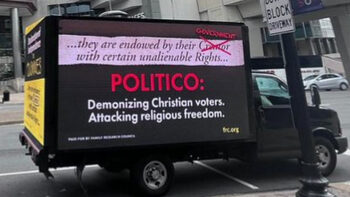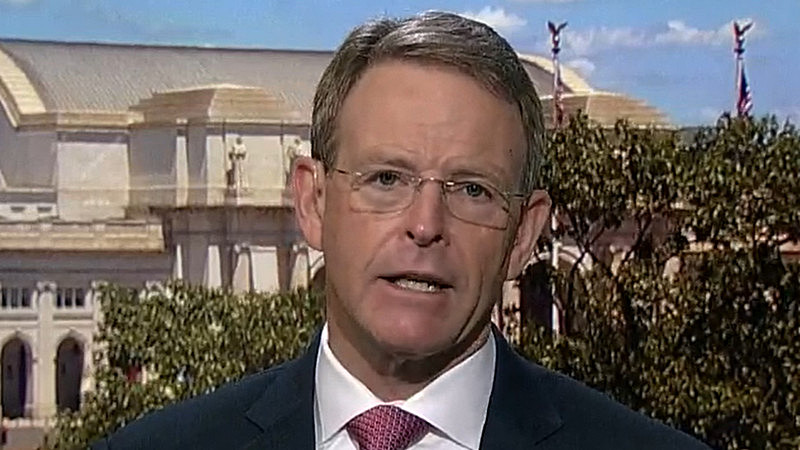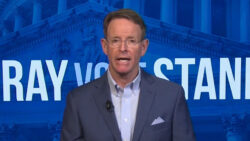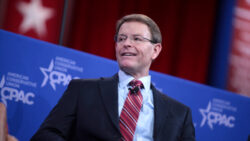Commentary
Religious-right leaders are not happy that journalists are paying more attention to Donald Trump’s Christian nationalist supporters’ plans to use the power of the federal government to impose their worldview on Americans if Trump wins this year’s election. The Family Research Council has launched a smear campaign against POLITICO and one of its journalists in what appears to be a cynical, dishonest effort to intimidate reporters and editors by threatening that they will be accused of anti-Christian bias if they cover the increasingly aggressive Christian nationalist movement. The FRC campaign fits neatly into a long, dishonorable history of religious-right leaders equating criticism of their political agendas and tactics with attacks on Christianity itself.
What’s the truth about POLITICO’s coverage of Christian nationalism?
On Feb. 20, POLITICO published a significant article by Alexander Ward and Heidi Przybyla about plans by Trump allies to infuse Christian nationalism into a new Trump administration. Their reporting built on other media coverage of Christian nationalist rhetoric and policy aims contained in the Heritage Foundation’s Project 2025. POLITICO cited internal documents from the Center for Renewing America—started by a former Trump administration official after the 2020 election—explicitly listing “Christian nationalism” among the group’s priorities for a new Trump term.
FRC and other right-wing figures have focused less on the article than on a subsequent MSNBC appearance by Przybyla, in which she discussed the emergence of a more aggressive Christian nationalism among Trump supporters and cited the recent ruling by the Alabama Supreme Court in which the chief justice repeatedly invoked the Bible and Christian theologians in declaring that fertilized eggs should be treated as persons under the law.
Przybyla was less precise in her spoken remarks than in her written coverage, and she has since acknowledged that she used “clumsy words” in defining Christian nationalism on television. In a thoughtful response to her critics, she sought to clarify what she believes about the importance of church-state separation and the value of covering the Christian nationalist movement:
Every person’s spiritual motivations are entitled to respect. Once these motivations take them onto the stage of politics and lawmaking that will affect the lives of fellow citizens, however, they will be treated the same as any other political actor.
That means they can expect journalistic scrutiny. They can expect fair and well-reported coverage of their political aims and the tactics used to advance them. They cannot expect exemption from criticism from people who oppose their agendas, nor any extra deference for their political words or actions simply because they are motivated by religious belief. …
Christianity is a religion. Christian Nationalism is a political movement. As I said on air, there is a big difference between the two.
Why Are the Family Research Council’s Claims Bogus and Hypocritical?
The Family Research Council announced Tuesday that it is hiring a mobile billboard to target Politico’s offices in New York and Washington, D.C. “demanding Politico stop demonizing Christians and attacking religious freedom.” The group is promoting a petition charging Przybyla with “malicious smears made against the Christian faith.” There is no way in which Politico’s news coverage is demonizing Christians or attacking religious freedom; this is a go-to distraction tactic of religious right leaders to label anyone who criticizes their political actions as enemies of faith and freedom and Christianity itself.
.
FRC President Tony Perkins released a statement Tuesday decrying “’Christian Nationalism’ propaganda” and charging that “the Left’s coordinated use of ‘Christian nationalism’” is “an intimidation game designed to silence Christians and suppress our votes.”
Where to start?
- Perkins’ disingenuous suggestion that Christian nationalism is merely a creation of leftist propagandists is utterly debunked by the POLITICO article in which former and likely future Trump officials explicitly list “Christian nationalism” as one of their top priorities for the new administration. Many Christian nationalist religious and political figures are now openly embracing the term.
- FRC’s claims that that media coverage is an attack on religious freedom in America must be considered in the light of their very mixed and selective record on religious freedom. Perkins and other FRC officials have previously argued that American Muslims, adherents of “fringe religions,” and even LGBTQ-affirming Christians do not deserve the same level of First Amendment protections as conservative Christians.
- Perkins and FRC board chair Michele Bachmann are supporting what may be the most brazen Christian nationalist effort being undertaken at the moment: a move by the American Family Association’s Center for Judicial Renewal to convince Republican presidential candidates and senators to use an explicit religious test to exclude potential Supreme Court nominees who fail to meet the Center’s “biblical worldview” standard. It is hard to imagine anything that runs more counter to the words and spirit of the Constitution. They have created dossiers on the “biblical worldview” of conservatives mentioned as possible court nominees, and published a list of those deemed unacceptable as well as those who do pass their religious test, such as the head of the religious-right legal giant Alliance Defending Freedom.
The Importance of Seeing Through FRC’s Smears
Christian nationalism is a political ideology embraced by millions of Americans and aggressively promoted by leaders in the MAGA movement and Trump’s inner circle. Christian nationalist ideology is being mobilized to try to return Trump to power, and to justify the authoritarian, anti-equality, anti-personal-freedom battle plan that right-wing movement leaders are preparing to deploy if they are successful in putting Trump back in power. As such this movement urgently cries out for more, not less, scrutiny by journalists and scholars.
Scholars use a number of different approaches to defining and measuring Christian nationalist sentiment. Right Wing Watch has informally defined it this way: “Christian nationalism is grounded in beliefs that the United States was founded by and for Christians, that being a ‘Christian nation’ is central to national identity, and that it’s the job of activists and government officials to keep it that way.”
Contrary to the Family Research Council’s smears, criticizing Christian nationalism is not the same as attacking Christianity. Indeed, many Christians reject Christian nationalism as a distortion of their faith and a threat to democracy, as evidenced by the existence of Christians Against Christian Nationalism and the number of Christian leaders who appear in “God & Country,” a new documentary about Christian nationalism.
Scholars have documented that people who hold strong Christian nationalist beliefs are more likely than other Americans to support authoritarianism and embrace the idea that political violence may be necessary to move the country in the right direction. Christian nationalism played a significant role in motivating and mobilizing the crowds that attacked the U.S. Capitol to keep Trump in power after his 2020 defeat. Millions of conservative Christians have been told over and over again that God had anointed Trump to lead America back to God, and have been urged to wage “spiritual warfare” against the Trump’s “demonic” opponents.
It is worth noting here that Family Research Council officials—and many other religious-right leaders—were involved in multiple ways in Trump’s efforts to hold onto power after his defeat. Journalists and public officials should refuse to be intimidated by religious-right leaders using intimidation tactics to insulate their movement from urgently needed scrutiny.
| Every day, Right Wing Watch exposes extremism to help the public, activists, and journalists understand the strategies and tactics of anti-democratic forces—and respond to an increasingly aggressive and authoritarian far-right movement. The threat is growing, but our resources are not. Any size contribution will help us continue our work and become more effective at disrupting the ideologies, people, and organizations that threaten our freedom and democracy. Please make an investment in Right Wing Watch’s defense of the values we share. |









